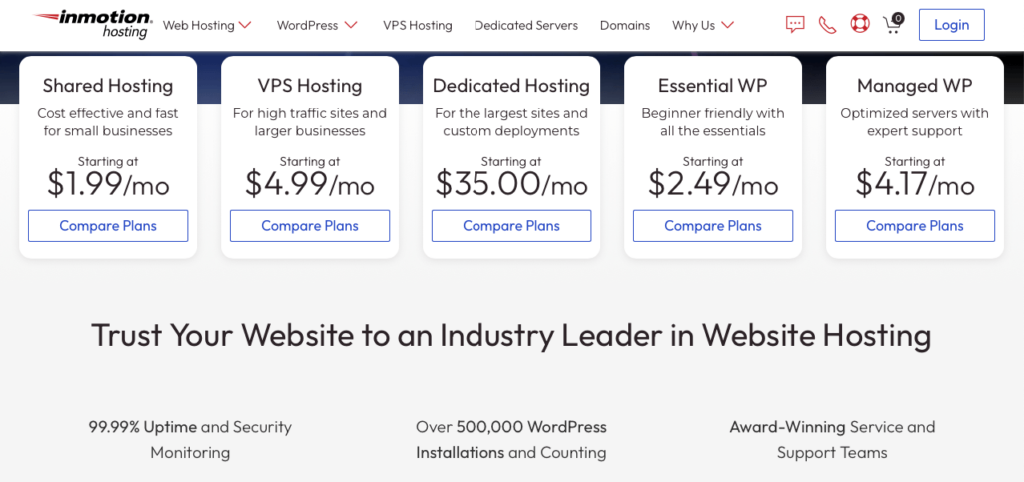Linux hosting is the backbone of the internet, powering millions of websites, applications, and services globally. It’s renowned for its open-source nature, stability, and cost-effectiveness, making it an excellent choice for everyone from beginners to large enterprises.
This guide delves into everything you need to know about Linux website hosting, helping you make an informed decision based on your unique requirements.
What Is Linux Hosting?
Linux hosting is a web hosting solution that operates on the Linux operating system, which is known for being free, open-source, and highly customizable. It is the preferred hosting solution for developers and businesses that require flexibility and performance at an affordable price point.
Linux hosting refers to any hosting environment that runs on the Linux operating system, an open-source platform developed by a global community of programmers. Unlike Windows hosting, which requires licensing fees for software, Linux is free to use, which often results in lower hosting costs.
Additionally, Linux is compatible with many of the web’s most popular technologies such as Apache, MySQL, and PHP, making it the go-to choice for website owners using open-source applications.
Popular distributions used in hosting include:
- Ubuntu: Known for its ease of use and large community support.
- CentOS: A favorite for web servers due to its stability.
- Debian: Focuses on reliability and is favored for long-term projects.
Benefits of Linux Hosting
Linux website hosting offers several advantages over other types of hosting, such as its security, flexibility, and cost-effectiveness. Below, we outline why Linux remains a popular choice for developers, businesses, and individuals alike.
- Cost-Effective: Linux hosting typically costs less than Windows hosting because there are no licensing fees. This allows hosting providers to offer more affordable plans.
- Stability and Reliability: Linux is renowned for its stability, and servers running Linux can operate for years without needing a reboot. This ensures better uptime for websites and applications, a crucial factor for businesses reliant on 24/7 availability.
- Security: Linux is considered one of the most secure operating systems. The open-source nature means that thousands of developers regularly examine the code for vulnerabilities. Additionally, Linux users benefit from granular control over security settings.
- Compatibility with Popular Web Software: Linux works seamlessly with many of the web’s most popular applications, such as WordPress, Joomla, and Magento, as well as technologies like Apache, PHP, MySQL, and Node.js.
- Scalability: Linux can handle everything from small personal websites to large-scale applications, making it a versatile solution that grows with your needs.
Types of Linux Hosting
There are several types of Linux hosting available, each designed to meet specific needs. Whether you’re running a small personal blog or a high-traffic eCommerce website, there’s a Linux hosting solution for you.
Shared Linux Hosting
Ideal for smaller websites or personal blogs shared hosting means your website will share resources with other websites on the same server. This is the most affordable option but comes with limitations in terms of performance and resource allocation.
VPS Linux Hosting
A Virtual Private Server (VPS) divides a single physical server into multiple virtual servers, each with dedicated resources. This option is great for growing businesses that need more power and customization options than shared hosting can provide.
Dedicated Linux Hosting
With dedicated hosting, you get an entire server to yourself. This is the best option for high-traffic websites or applications that require significant resources and full control over the hosting environment.
Cloud Linux Hosting
Cloud hosting spreads your website across multiple servers, ensuring better uptime and scalability. It’s perfect for businesses expecting rapid growth or fluctuating traffic.
Managed vs. Unmanaged Hosting
Managed hosting means the hosting provider handles all the technical details, such as server maintenance and security updates. Unmanaged hosting, on the other hand, gives you full control of the server, making it suitable for advanced users.
How to Choose the Best Linux Hosting Provider
Choosing the right Linux hosting provider can make a significant impact on your website’s performance, security, and overall user experience. Several factors should influence your decision, depending on your needs.
- Performance and Uptime: Ensure that your hosting provider has a reputation for excellent server performance and guarantees at least 99.9% uptime.
- Technical Support: If you’re not comfortable managing your server, look for a provider that offers 24/7 support, especially if you’re opting for unmanaged hosting.
- Pricing and Cost-Effectiveness: Compare hosting plans to find one that fits your budget. Look out for hidden fees, such as higher renewal rates or extra costs for backups and security features.
- Ease of Use: Opt for a provider that offers an intuitive control panel, such as cPanel or Plesk, to simplify server management.
- Security Features: Make sure your provider includes essential security features like firewalls, DDoS protection, and SSL certificates.
- Scalability: Choose a hosting provider that allows you to easily upgrade your plan as your website grows, whether that means moving from shared to VPS or dedicated hosting.
Best Linux Hosting Providers in 2024
There are numerous Linux hosting providers, but not all offer the same level of service, performance, or value for money. Below are the top Linux website hosting providers in 2024 based on features, pricing, performance, and customer support.
HostGator

HostGator offers reliable and affordable shared Linux hosting plans that are perfect for beginners and small businesses. Their plans come with a free domain for the first year, free SSL certificates, and unlimited bandwidth, making them a solid choice for anyone looking to get started quickly and affordably.
Bluehost

Bluehost is officially recommended by WordPress and is an excellent choice for anyone building a WordPress site. Their Linux hosting plans come with one-click WordPress installation, 24/7 support, and free domain registration. It’s great for users who want simplicity and reliability.
SiteGround

Known for its fast performance and top-notch customer support, SiteGround is a great option for more advanced users. They offer a range of features like daily backups, free CDN, and free SSL certificates. It’s ideal for websites that prioritize performance and security.
InMotion Hosting

InMotion Hosting is a business-oriented hosting provider that offers robust VPS and dedicated hosting options. Their Linux plans are optimized for speed and come with high-quality customer support. They also offer free website migration, making it easy to switch from another host.
A2 Hosting

A2 Hosting is renowned for its turbo servers, which promise 20x faster speeds than traditional hosting solutions. Their Linux hosting plans come with free site migration and a range of developer-friendly features like SSH access and multiple PHP versions, making them an excellent choice for performance-focused websites.
DigitalOcean

DigitalOcean provides cloud-based Linux hosting that is perfect for developers and businesses that need scalability. With flexible pricing and the ability to quickly spin up new servers, DigitalOcean is a popular choice for startups and developers who need a simple and reliable hosting platform.
Kamatera

Kamatera offers cloud-based hosting solutions with a focus on scalability and performance. Their pay-as-you-go pricing model allows businesses to scale resources up or down as needed, making them an ideal choice for companies that experience fluctuating traffic or resource needs.
VPS.us

VPS.us stands out with its KVM VPS hosting, offering high-performance hardware and fully isolated virtual environments. With a focus on reliability and scalability, VPS.us is an excellent choice for businesses and developers seeking an affordable, secure, and high-performance hosting solution.
Common Challenges with Linux Hosting and How to Overcome Them
While Linux hosting offers numerous benefits, it also presents some challenges, particularly for beginners or those unfamiliar with server management. Below are some common issues users face with Linux hosting and how to overcome them.
- Server Management: Unmanaged Linux hosting provides more flexibility but requires technical expertise to handle server configurations, updates, and security patches. Consider opting for managed hosting or hiring an external administrator if you’re not confident with server management.
- Learning Curve: Linux commands can be overwhelming for beginners. However, many hosting providers offer user-friendly control panels like cPanel or Plesk to simplify server management tasks.
- Compatibility Issues: Some software applications, especially those designed for Windows, may not be compatible with Linux. Before choosing Linux hosting, ensure that the applications you intend to run are compatible with the Linux environment.
- Security Concerns: While Linux is inherently secure, the open-source nature of the operating system means security vulnerabilities can still arise if the server is not properly configured or maintained. Regular updates and using a robust firewall can mitigate these risks.
Conclusion
Linux hosting is an affordable, flexible, and secure solution for a wide range of users, from individuals running personal blogs to large enterprises, Linux hosting provides a reliable, scalable, and cost-effective platform.
Choosing the right provider and plan depends on your specific needs, such as performance, budget, and technical support requirements. Whether you’re a beginner looking for shared hosting or a developer needing a robust VPS or dedicated server, Linux website hosting offers something for everyone.
By leveraging the strengths of the Linux OS and selecting a reliable provider, you can ensure that your website or application is set up for long-term success.
Why Choose VPS.us for Your Linux Hosting Needs
At VPS.us, we take pride in delivering high-performance KVM VPS hosting that can meet the demands of modern developers and businesses. Our KVM1-US plan, starting at $10 per month, provides you with 1 vCore, 1 GB of RAM, and 20 GB of NVMe storage—perfect for small to mid-sized projects that need speed, reliability, and dedicated resources.
Whether you’re launching a web application or hosting a high-traffic website, our enterprise-grade SSDs and dedicated resources guarantee that your projects will run smoothly and efficiently.



